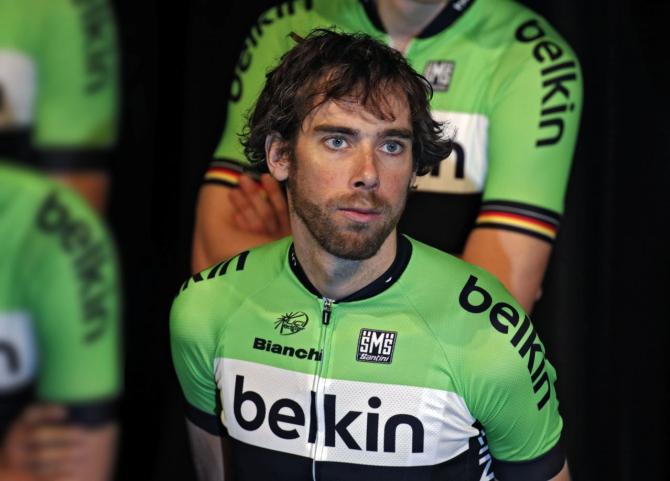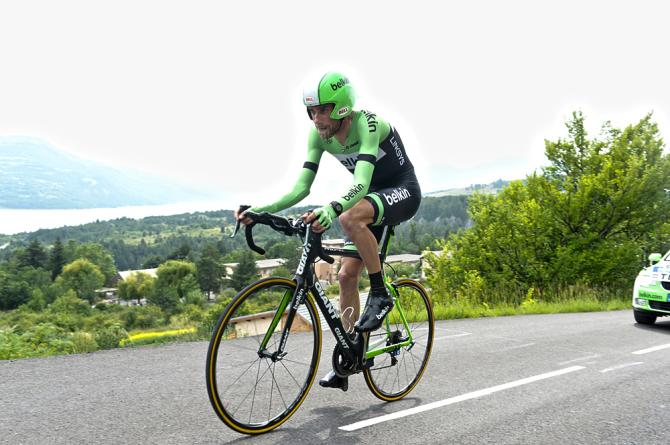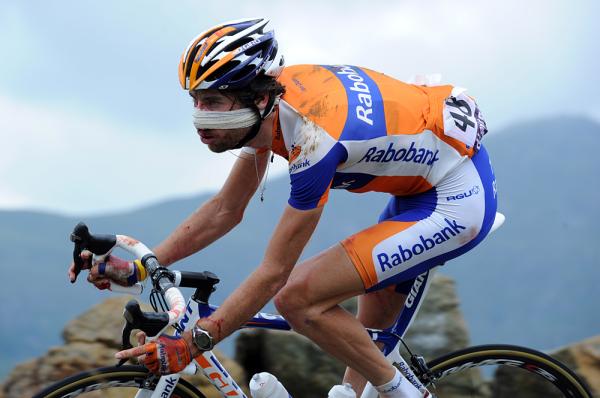Ten Dam: Why I’m clean and a peloton that offers me more opportunities
Belkin rider on his late arrival in the big time



In Calpe, as Belkin gathers for their yearly winter training camp, a relaxed Laurens ten Dam opens up about the ups and down of the previous year. It was a season that saw the Dutchman compete in GC at the Tour de France until a crash and a loss of form saw him dip outside the top ten. Nevertheless it was his best-ever finish in the race and one that has taken over a decade of hard work in the pro-ranks to reach.
However, 2013 wasn’t just about results. Just over twelve months ago the sport was reeling from the effects of USADA Reasoned Decision, with Rabobank and Dutch cycling unable to escape the blast zone.
Within weeks of the report being published, one of the sport’s longest standing sponsors had thrown in the towel. Although the bank would meet financial obligations for the squad’s short-term future, they wanted their name off the jerseys with immediate effect. For a sponsor that had endured its fair share of doping scandals, enough was enough, and with Michael Rasmussen’s court case on the horizon, Rabobank cut its losses.
Rabobank quickly became Blanco, Blanco morphed into Belkin and a new era began as the team’s management successful attracted a blue chip company into the sport.
“It feels like another team. It didn’t feel like Rabobank anymore,” Ten Dam says.
“It’s new bikes, different colours and it’s strange because there’s one guy in the development team who was training on his old Rabobank kit but it’s been a really quick change. We’ve two new team directors and I use this example, but the speech from Belkin at our press event was totally different to the speech of a banker. He was in his jeans and a Belkin polo shirt and the whole atmosphere was different.”
A different lick of paint and new kit can do wonders for a brand’s image but cycling is perhaps a far smaller, closer-knit collection of riders and ex-riders than people give it credit for. Belkin have made more of an effort than most teams to break from the past – their handing of the Luis Leon Sanchez time bomb is a recent example – but they remain intrinsically tied to their roots nonetheless.
Get The Leadout Newsletter
The latest race content, interviews, features, reviews and expert buying guides, direct to your inbox!
In a positive sense, Ten Dam goes some way to personify the team’s new ethos as well as their history. As a child he looked upon the likes of Michael Boogerd as heroes and signed for Rabobank’s development team in 2001. A move to the top tier at the bank failed to materialise and he found himself bumping around at smaller squads until a break came in 2008 and he was given his chance at WorldTour level again.
“When I was a teenager I had posters of Rabobank on my walls, you know, pictures of Boogerd. As a junior I would take pictures out of the magazines and put them up. To look back it’s difficult, especially for a team that goes back to 1996,” he says.
“I still disagreed with the sentiment that cycling was rotten to the core,” he quickly adds, pointing to the statement Rabobank left as their parting shot to the sport.
“I think the team of 2010, 11, 12, wasn’t rotten. We all know what happened from Rassmussen’s book around the time of 2007, but from 2008 I didn’t see anything. I think we’ve been a clean team and we’re part of the solution. And if Rabobank wanted to stop for those reasons, they should have pulled out in 2007.”
“Doping is no longer the conversation at the dinner table. The attitude to doping from riders has radically changed. If you dope or cheat, you’re now an asshole and if you notice something on your team, you now go straight to the doctor and tell him. We’re moving in the right direction and I really think that we’re now racing against the cleanest peloton from the last 40 years… if I believe all the stories coming from the 70s until now.
“It’s nicer to be a cyclist now as you don’t have to make that choice they did in the 90s for example. You can be a really good cyclist like me who did the first two weeks at the Tour in the top five without any issues. Just train, rest, eat, sleep. Repeat.”
Yet cycling’s past is on the shoulder of every rider in the current peloton, whether they’re directly linked to doping or simply associated by nationality, the colour of a jersey or a friendship. Ten Dam may say the right things, tweet the right tweets and do the right things, but he’s ridden with dopers, worked with doctors who have allegedly doped riders and taken orders from bosses who rode throughout the 90s. To be specific, he’s ridden on the same teams as Thomas Dekker and Carlos Barredo, worked with Dr Geert Leinders, and Erik Dekker calls the shots from the Belkin team car.
“Leinders was a nice guy and if you ask the Sky guys you’ll find they say the same things,” Ten Dam says.
“He never proposed anything bad to me and I thought he was a good doctor with me.”
But surely he knew the reputation the doctor carried with him?
“I wasn’t naïve but there’s a difference between imagining and knowing. With Erik, I don’t know what he’s done. I only judge Dekker on what I know, just like I only judge Leinders on what he did then with me. Erik Dekker to me is a good team director and I can say for sure that he’s never asked me to do bad things. To me he’s a good colleague.
“Barredo was a massive shock to me and Luis Leon was mentioned in a few cases. I don’t know. I don’t think he should be on the team still but you have to ask the manager on that one. When I’m a manger of a team I can answer that but as a rider on a team, I can’t say.
“When I turned pro in 2004 I was really proud of that moment but last year I was at a birthday party and I was introducing myself to people I didn’t know,” he says.
“I was telling people what I was and for a second I was hesitating to tell people my profession. I was a little bit ashamed. Since the Tour that’s changed a bit but the image of the sport went down at the end of 2012. I was angry, angry with the guys who used dope but also with the journalists who were writing about something like the Tour of 89 or 07.
“I hope we can move on. We have a bit in Holland but it’s always the shit from the past that rises to the surface. At the same time, if there’s something going on now, I hope people discover it.”
Long road
Ten Dam has certainly enjoyed an upward trajectory in terms his results since the turn of the decade and capped last season with thirteenth place in the Tour de France. A top five position had been within touching distance until a crash and a few wobbles in the last set of tiring mountain stages saw his rivals overtake him.
This year he will once again concentrate on the Tour as he rides wingman for Bauke Mollema and Robert Gesink in the mountains. It’s a role he has become accustomed to over the last few seasons and although not a prolific winner in his own right, he has proved that he can ride consistently in stage races, whether it’s over a single week or three.
“They’re the big guns and I’m just behind. In the first week I need to copy them and save time and energy and then in the mountains look to help them as much as possible,” he says.
“I’m a good rider but I’m not like Valverde, Rodriguez or Froome. They’re something above me. On a good day I can go with them and I hope to be able to do that for three weeks but to be on the podium, I’ve not dreamed of that since I was a little boy.”
To some, that may look like a lack of ambition, but Ten Dam is merely aware of his limitations and ability as a rider. Here’s a rider who scrapped and saved at €20,000 a year after he was moved off the Rabobank development team. He did not race for fame or fortune and admits that his best result in 2004 – third in the Ster Elektrotoer – gave him all the satisfaction he needed.
“They were small races but I was really proud and happy. I never said to myself ‘I need to win a classic’ or I need to be the yellow jersey in July.”
He pauses as his mind wanders back to the years he rode for Bankgiroloterij and Unibet.
“Back then I wasn’t really naïve and I knew that the big guys were doing things that were not allowed. I just decided to not do it because I was happy with where I’d reached. The teams were happy and I started to earn a bit more money and I was never going backwards. I think that’s why I stayed on the right path.”
The right path and a cleaner peloton have merged, according to ten Dam.
“Basically in 04 to 07, I was in smaller teams. The first four years of my career I didn’t do grand tours and I earned a lot less money than I do now. I was still enjoying it but I was lucky that I was on smaller teams so I didn’t do the big races and that I was talented enough to get some results in the smaller races.
“My first contract was €20,000 a year but I was just as happy as I am now. I started low, really low-key and now I’m doing the Tour, the Vuelta and the Worlds. That has to do with my form but also opportunities because I wouldn’t have had them if it had stayed as dirty as it had back then.”
Now 33, Ten Dam is heading towards the tail end of his career. However, having made the switch to the top echelons of the sport in 2008, and having only ridden his first grand tour at 27, he may have more time on his side than most. He’s had an offer in the past from Garmin and Sky held initial discussions with his agent too, but Belkin is where his heart lies, a team where Ten Dam has made his home and survived the good and bad of the sport.
“On the teams I was on in the past I never even thought I’d be racing at the Tour. You have to stay a little bit humble. I’m 33 but maybe I can carry on. I started late in the grand tours but we’ll see with the legs. I’m not the most talented guy in the world and I know I just have to work hard. Sometimes it works out, sometimes it doesn’t but I know that I’m still happy. I’ll be almost 35 [when my contract ends] but from that point I’ll take it year by year. For now I’ve signed for two years and I’m willing to give my all.”
Daniel Benson was the Editor in Chief at Cyclingnews.com between 2008 and 2022. Based in the UK, he joined the Cyclingnews team in 2008 as the site's first UK-based Managing Editor. In that time, he reported on over a dozen editions of the Tour de France, several World Championships, the Tour Down Under, Spring Classics, and the London 2012 Olympic Games. With the help of the excellent editorial team, he ran the coverage on Cyclingnews and has interviewed leading figures in the sport including UCI Presidents and Tour de France winners.
